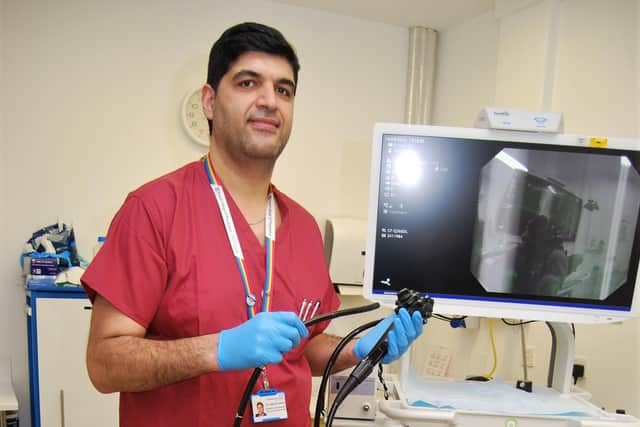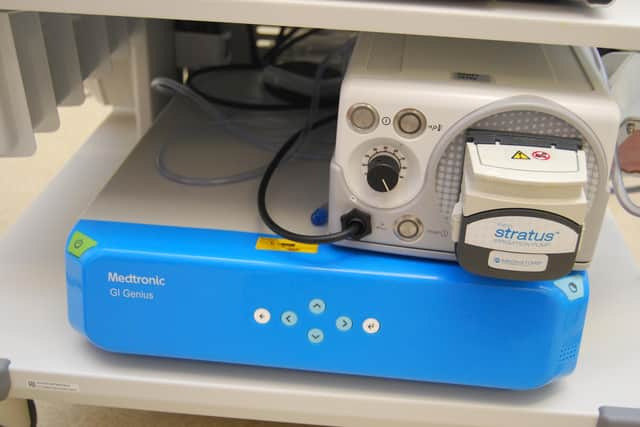How artificial intelligence is a 'second pair of eyes' in KGH cancer trial
and live on Freeview channel 276
Artificial intelligence (AI) is being used on some patients at KGH as part of a major study which aims to help better detect bowel cancer.
The Rothwell Road hospital is one of just nine NHS endoscopy units taking part in the UK-first clinical trial, called COLO-DETECT.
Advertisement
Hide AdAdvertisement
Hide AdUnits are trialling the use of GI Genius which is an AI device designed to help clinicians identify polyps during colonoscopies – examinations using a flexible camera to detect changes or abnormalities in the bowel (colon and rectum).


So far 390 patients from across the country have taken part in the study, which is being led by leading gastroenterologists at South Tyneside and Sunderland NHS Foundation Trust. They include 114 patients at Kettering General Hospital – making them one of the lead contributors to the research.
KGH consultant gastroenterologist and director for research and innovation, Dr Ajay Verma, said: “We are absolutely delighted to be supporting this world-leading research into the use of AI in bowel cancer screening being pioneered by South Tyneside and Sunderland NHS Foundation Trust (STSFT).
“What it means at a local level for us is that KGH patients who agree to take part in the clinical trial have either a normal colonoscopy or colonoscopy which also uses the AI equipment. They are patients who need further investigation through the national bowel cancer screening programme.
Advertisement
Hide AdAdvertisement
Hide Ad“The research is aiming to find out if the AI technology can assist doctors to essentially find more small growths called polyps which can become cancerous.


"The technology scans the bowel images during the colonoscopy and acts as a ‘second pair of eyes’ looking for the sometimes tiny polyps that can go on to cause cancer.
“The trial aims to test a large number of patients to see if using AI does find more polyps. If it proves to be very effective that would mean more polyps detected early on and more lives saved from bowel cancer.”
Dr Verma said that KGH is aiming to recruit 350 patients towards the trial which is aiming to recruit about 2,000 patients across the nine NHS units.
Advertisement
Hide AdAdvertisement
Hide AdThe study is being led by Professor Colin Rees, a consultant gastroenterologist at South Tyneside and Sunderland NHS Foundation Trust.
He said: “Tragically around 16,000 people die from bowel cancer each year, making it the UK’s second biggest cancer killer. We want to reduce the number of deaths by diagnosing disease in the bowel before it even becomes cancerous and by finding cancer earlier.”
Bowel cancer is entirely treatable, and in some cases curable, especially if it’s diagnosed early - which is why studies like COLO-DETECT are so important.
The GI Genius AI devices have been used at KGH since they joined the research trial in July 2021.
Advertisement
Hide AdAdvertisement
Hide AdKettering General Hospital’s deputy medical director, Dr Suganya Sukumaran, said: “As part of our hospital group’s academic strategy we aim to grow the number of clinical trials our patients can access.
“I am delighted to see this ground-breaking piece of work around the detection of bowel cancer.
“By developing our research capacity we will also make the University Hospitals of Northamptonshire Group a desirable place to work for the UK’s top NHS talents to work.”